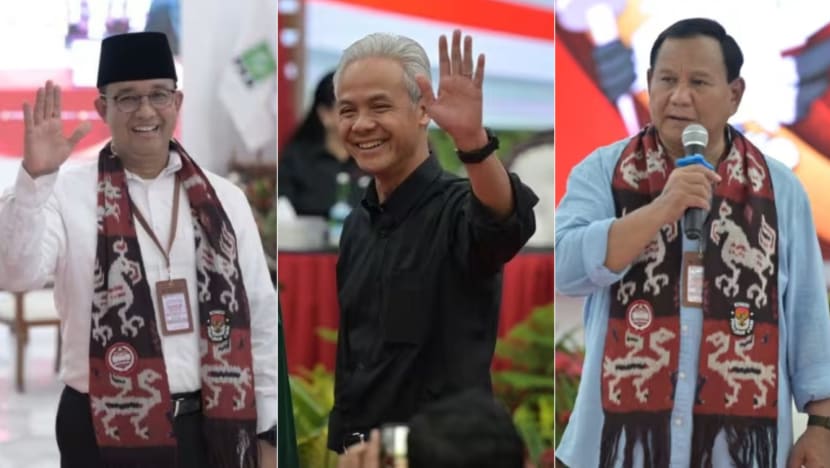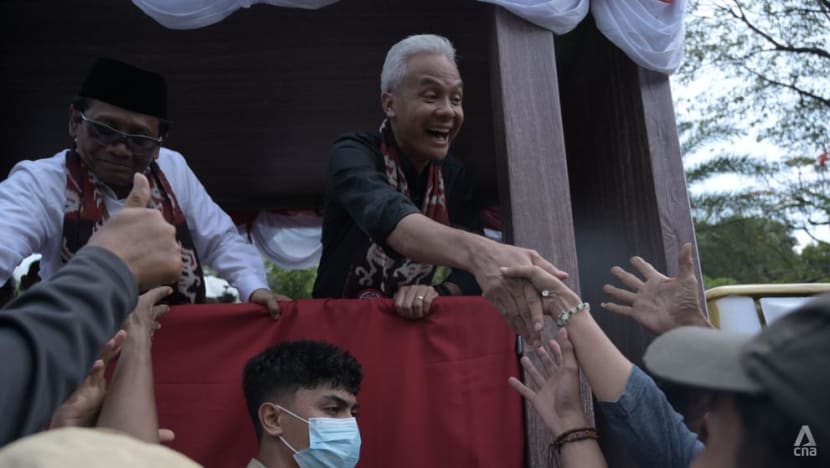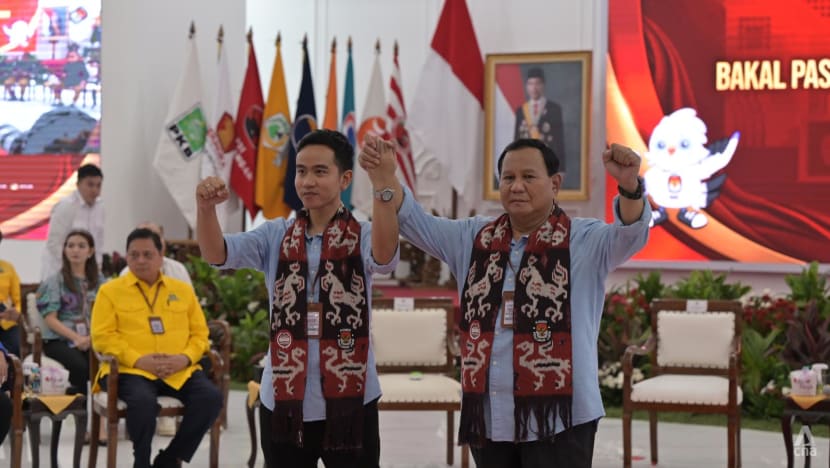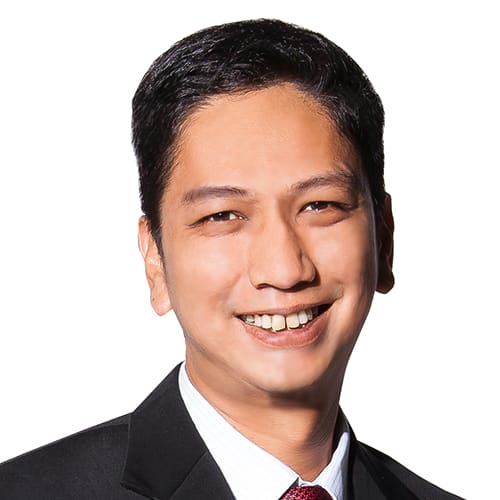A closer look at the three candidates and their running mates contesting Indonesia's Feb 14 presidential election
Two former governors and a current minister are seeking to become Indonesia’s next president, and analysts are predicting a tight contest in the country's first three-horse race since 2009.

Indonesia's presidential candidates: former Jakarta governor Anies Baswedan (left), former Central Java governor Ganjar Pranowo and Defence Minister Prabowo Subianto. (Photo: CNA/Wisnu Agung Prasetyo, Danang Wisanggeni)
JAKARTA: A changing of the guards is coming to Indonesia on Oct 20, 2024 when President Joko Widodo – who will have led the country for two five-year terms – will step down and his successor sworn in.
Who gets to lead Southeast Asia’s biggest economy for the next five years will be decided in a presidential election on Feb 14.
People in the world’s fourth-most populous country – as well as the international community – are anxious whether the next president will continue or instead undo Mr Widodo’s foreign policies as well as his social and infrastructure programmes.
The current president, popularly known as Jokowi, is barred from running for a third term by the Indonesian Constitution.
Three candidates have so far registered with the general elections commission to run for the presidency: former Jakarta governor Anies Baswedan, former Central Java governor Ganjar Pranowo and Defence Minister Prabowo Subianto.
Analysts are predicting a tight race.
“Based on (popularity) polls, no candidate seems set to win the election by a comfortable margin,” Mr Djayadi Hanan, executive director of the think tank Indonesian Survey Institute (LSI) told CNA.
According to pollster Lembaga Survei Indonesia (LSI) on Oct 22, Mr Subianto and Mr Gibran Rakabuming Raka are leading with 35.9 per cent, followed by Mr Pranowo and Mr Mahfud MD at 26.1 per cent.
In third place are Mr Baswedan and Mr Muhaimin Iskandar, whose popularity rating is 19.6 per cent.
With no candidate enjoying a comfortable lead over the others, analysts say the trio will need running mates which can boost their chances of wooing the 204 million eligible voters.
Mr Baswedan has chosen Mr Iskandar, the chairman of the National Awakening Party as his running mate while Mr Pranowo picked coordinating minister for security Mahfud MD.
Meanwhile, Mr Subianto chose Mr Raka - who is the eldest son of the current president Mr Widodo - as his partner in the presidential election.
Here is what you need to know about the candidates:
ANIES BASWEDAN AND MUHAIMIN ISKANDAR
Before entering politics, Mr Baswedan was an academic, serving as the rector of Paramadina University in Jakarta between 2007 and 2014.
The 54-year-old was also the founder of a popular programme called Indonesia Mengajar (Indonesia Teaches) in 2009 which sends university students and graduates on a one-year teaching mission in some of the most remote areas of Indonesia with little access to quality education.
The programme’s popularity is said to have inspired Mr Widodo to pick him as minister of education when the former became president in 2014. But Mr Widodo was apparently unhappy with Mr Baswedan’s performance and had him replaced in 2016.
.jpeg?itok=2nUqJQ6s)
One year after he was removed from cabinet, Mr Baswedan decided to run as Jakarta governor, going up against two other candidates: the incumbent Basuki Tjahaja Purnama, a close friend of Mr Widodo, and Mr Agus Yudhoyono, the son of former president Susilo Bambang Yudhoyono.
Although popular for his hard work and a series of reforms he introduced, Mr Purnama, a Christian of Chinese heritage known popularly by his Hokkien name Ahok, was accused of blaspheming Islam when he made a comment about an Islamic verse which is often used by Muslim conservative groups to convince Muslims not to vote for a non-Muslim leader.
Analysts noted that Mr Baswedan never distanced himself from the intolerant hardline groups criticising the Christian governor and instead capitalised on the growing resentment towards Ahok by attending several anti-Ahok rallies organised by said groups.
After losing the election to Mr Baswedan, Ahok was sentenced to two years in prison for blasphemy by the North Jakarta District Court.
Mr Baswedan has repeatedly denied using identity politics to win the 2017 Jakarta election.
“Whenever you hear ‘Anies is intolerant, discriminative, unfriendly’ just ask ‘where is the proof?’,” he told his supporters in November last year.
Mr Burhanuddin Muhtadi, executive director of think-tank Indikator Politik, noted that the same anti-Ahok groups have expressed their support for Mr Baswedan’s presidential nomination.
“Although their numbers may be small, they are more loyal and militant,” he told CNA.
Mr Muhtadi said compared to those backing other candidates, Mr Baswedan’s supporters are more willing to go to great lengths for their candidate of choice, such as conducting door-to-door campaigning or mobilising others to attend campaign rallies.
Mr Baswedan is supported by a coalition of four political parties: the National Democratic Party (Nasdem), the National Awakening Party (PKB), a staunch opposition of Mr Widodo’s administration the Prosperous Justice Party (PKS) and the Ummat Party, a newcomer which does not have seats in parliament.
The parties call themselves the Change for Unity Coalition (Koalisi Perubahan Untuk Persatuan), which Mr Muhtadi said provide hints that Mr Baswedan might be out to undo some of Mr Widodo’s policies if he is elected.
Mr Baswedan has promised to provide all Indonesians with access to quality and affordable public services, education and health as well as creating more economic opportunities to under-developed areas in the country.
Meanwhile, his running mate Mr Iskandar is a 57-year-old party chairman who has been active in politics since he was in college.
When several figures inside Indonesia’s biggest Islamic organisation Nahdlatul Ulama (NU) decided to form their own political party, the PKB in 1998, Mr Iskandar, who comes from a family of NU clerics decided to join. He became a PKB member of parliament the following year.
Mr Iskandar subsequently rose to PKB’s ranks and in 2005 became chairman of the party.
Partnering with Mr Iskandar in theory allows Mr Baswedan to tap into the NU voter base. The organisation has thousands of Islamic schools across the country producing millions of graduates who remain loyal to NU.
But recent polls suggest that the move barely improves Mr Baswedan’s popularity, which has stagnated since the September announcement, even in NU stronghold East Java.
"Not all NU supporters are PKB voters and not all PKB voters are Muhaimin’s supporters," Mr Adi Prayitno, executive director of think-tank Parameter Politik Indonesia, told CNA.
Instead, Mr Baswedan’s decision to pick Mr Iskandar as his running mate in September had cost the pair support from the Democratic Party, a former coalition member which had earlier lobbied for Mr Baswedan to pick its chairman Agus Yudhoyono.
The Democrats have since joined Mr Subianto’s coalition of political parties.
GANJAR PRANOWO AND MAHFUD MD
Mr Pranowo served as a member of parliament for two terms before becoming the governor of Central Java in 2013.
Since he became governor, Mr Pranowo has often been compared with Mr Widodo because of the pair’s casual and approachable leadership style and habit of visiting places that other top politicians and public officials hardly ever set foot on, such as traditional markets, villages and poor urban neighbourhoods.
Out of the three candidates, analysts said Mr Pranowo is the one most likely to continue Mr Widodo’s policies and programmes.

“If elected, Ganjar will not allow the (infrastructure) development carried out by Jokowi to halt,” Yunarto Wijaya, executive director of think-tank Charta Politika, told CNA.
Mr Pranowo, 54, is a member of the Indonesian Democratic Party of Struggle (PDI-P) and known to be loyal to the party’s founder and chairwoman Megawati Soekarnoputri, the daughter of the country’s first president Sukarno who herself became Indonesia’s first and only female president in 2001.
But if elected, analysts predict that Mr Pranowo might have to balance his position as leader of the country and his status as a party cadre loyal to the wishes of party chairwoman Mdm Soekarnoputri.
Mr Pranowo's vision is to produce more workers skilled in science and technology as well as to build a so-called national digital system in order to accelerate Indonesia's economic development.
Mr Pranowo is currently supported by a coalition of four political parties: the PDI-P, the United Development Party (PPP) , the United Indonesia Party (Perindo) and People's Conscience Party (Hanura). The latter two parties do not hold any seats in parliament.
This means he might have to navigate around strong parliamentary opposition to enact strategic programmes and policies if he is elected.
The coalition on Oct 18 appointed Mr Mahfud to be his running mate. The 66-year-old, whose full name is Mohammad Mahfud Mahmodin, is a senior technocrat who has served in a number of public offices including as chief of the Constitutional Court between 2008 and 2013.
In 2019, President Widodo appointed Mr Mahfud as Coordinating Minister for Politics, Legal and Security, a position he still holds today.
Analysts say Mr Mahfud's credentials, as well as being a respected Nahdlatul Ulama scholar, could boost Mr Pranowo's chances in the election particularly among Muslim voters.
Mr Mahfud's decades-long experience as a technocrat and legal background could also be useful to Mr Pranowo should he secure the presidency.
PRABOWO SUBIANTO AND GIBRAN RAKABUMING RAKA
Mr Subianto, 72, is the oldest politician vying for the presidency in 2024 and by far the most experienced.
The retired army general has participated in three presidential elections before.
In 2009, Mr Subianto became Mdm Soekarnoputri’s vice-presidential candidate before gunning for the presidency twice in 2014 and 2019. In 2009, Mdm Soekarnoputri lost to Mr Susilo Bambang Yudhoyono while in 2014 and 2019, Mr Subianto lost to Mr Widodo.

The 2019 election was particularly polarising for the country as Mr Subianto, who lost by an 11 per cent margin to Mr Widodo, refused to concede and challenged the election result to the Constitutional Court by claiming that the president had committed widespread and systematic election fraud.
The country’s capital became the scene of massive protests from Mr Subianto’s supporters.
Tension between Mr Subianto and Mr Widodo subsided after the latter invited the former general to be in his cabinet and appointed him Defence Minister.
The former rivals eventually became close allies with Mr Subianto deciding to name Mr Widodo's eldest son, Mr Gibran Rakabuming Raka, as his running mate on Oct 22.
The 36-year-old is the least experienced candidate in the election, with just two years of experience in bureaucracy as the mayor of his hometown Surakarta, better known as Solo. It was a position once held by his father who served as the city's leader between 2005 and 2012.
Mr Raka was initially not qualified to run.
The election law previously states a presidential candidate or his running mate must be at least 40 years of age but the Constitutional Court on Oct 16 changed the requirement to exclude people who have served as elected public officials at either the national or local level.
The court is chaired by Dr Anwar Usman, who is married to Mr Widodo's younger sister.
Many have lambasted the ruling, calling it a blow to Indonesia's democracy as it allows the president to build his own political dynasty and retain power after he steps down next year provided that the Subianto-Raka ticket wins the election.
The pair promises to provide incentives, loans as well as grants for small entrepreneurs and businesses, which they say are key to Indonesia's economic growth.
They also promise to expand the reach of some of Mr Widodo's existing programmes like free education and cash aid for low-income families.
Mr Subianto is supported by a coalition of nine political parties, eight of which are national-level parties: his own Great Indonesia Movement (Gerindra), Golkar Party, National Mandate Party (PAN), the Democratic Party, the Star Crescent Party (PBB), the Indonesian Solidarity Party (PSI), Garuda Party and the Indonesian People's Wave Party (Gelora).
The latter four minor parties do not have any seats in parliament.
Mr Subianto is also supported by the Aceh Party which is only allowed to contest the provincial and district level parliamentary election in Aceh, Indonesia's westernmost province.
Mr Hanan of LSI said the big coalition might be both a blessing and a curse for Mr Subianto should he be elected as president.
On one hand it ensures more parliamentary support, “but it also means there will be compromises to appease the different parties supporting him,” Mr Hanan said.



















